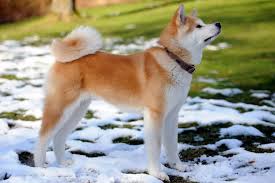
Akita
Conditions of detention
Akitas are adaptable to various living conditions but thrive best in homes with a yard where they can exercise freely. They require space due to their large size and need for physical activity.
Useful Fact: Akitas do well in cooler climates due to their thick double coat, which protects them from harsh weather.
Nutrition and diet
A balanced diet rich in high-quality protein is essential for Akitas. Their diet should be appropriate for large breeds with moderate activity levels.
Useful Fact: Split their meals into two servings a day to prevent bloating and ensure steady energy levels.
Health
Akitas are generally healthy but can be prone to specific conditions such as hip dysplasia, hypothyroidism, and autoimmune disorders. Regular veterinary check-ups are crucial.
Useful Fact: Early screening for hip dysplasia and regular thyroid function tests can help manage and prevent serious health issues.
Grooming and care
Akitas have a dense double coat that sheds heavily twice a year. Regular brushing is necessary to manage shedding and keep their coat healthy.
Useful Fact: During shedding season, daily brushing can help manage the fur and reduce the amount that ends up around your home.
Education and training
Akitas are intelligent but can be independent and strong-willed, making consistent and positive reinforcement training essential.
Useful Fact: Early socialization and obedience training are crucial for preventing behavioral issues and ensuring they become well-mannered adults
Toys and entertainment
Akitas enjoy interactive toys that challenge their minds and provide physical exercise. Toys for tugging, fetching, and problem-solving are ideal.
Useful Fact: Rotating toys periodically can keep them engaged and prevent boredom.
Safety
Ensure your home and yard are secure, as Akitas can be territorial and may try to roam or protect their territory.
Useful Fact: Training them to respond to basic commands like “stay” and “come” can enhance their safety and your control over them.
Accessories
Essential accessories include a sturdy leash, collar, and identification tag. A comfortable bed and robust chew toys are also important.
Useful Fact: Given their strength, investing in a high-quality, durable leash and collar is necessary for managing them during walks.
Socialization
Early socialization with various people, animals, and environments is critical for Akitas to develop a balanced temperament.
Useful Fact: Puppy classes can be particularly beneficial in providing structured socialization and basic training.
Travel and Transportation
Akitas can adapt to traveling if introduced to it gradually. Use a secure crate or harness for car travel to ensure their safety.
Useful Fact: Regular, short car rides can help them become comfortable with travel, reducing anxiety on longer trips.
Behavior and psychology
Akitas are known for their loyalty, courage, and sometimes aloof nature. They need mental stimulation and regular interaction with their family to stay happy.
Useful Fact: Providing them with a sense of purpose, such as participating in obedience or agility training, can satisfy their need for mental engagement.
Legal aspects
Familiarize yourself with local pet laws, including licensing, leash requirements, and breed-specific legislation, to ensure compliance and avoid legal issues.
Useful Fact: Many regions require Akitas to be registered and microchipped, ensuring they can be identified if lost.


